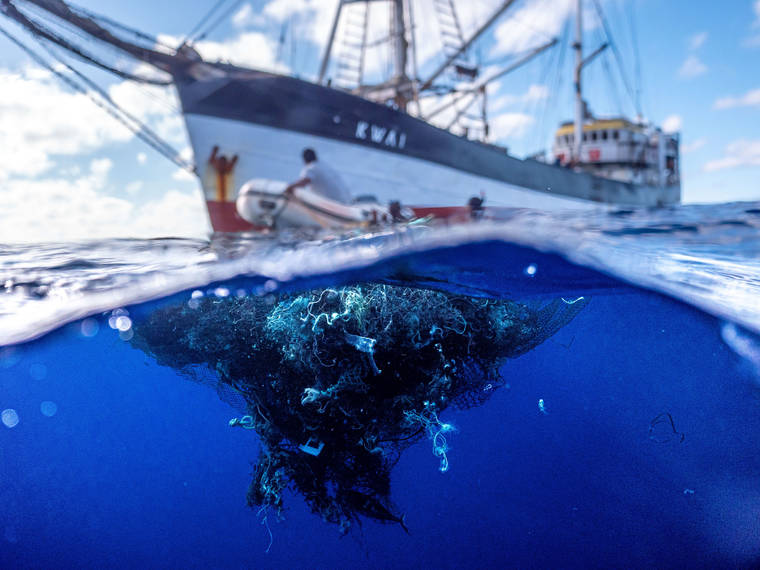Ocean Voyages Institute hauls in record 103 tons of trash from Pacific Ocean


COURTESY OCEAN VOYAGES INSTITUTE
The Ocean Voyages Institute this morning pulled into Pier 29 in Honolulu to unload 103 tons of marine trash hauled from the Great Pacific Garbage Patch after a 48-day expedition aboard the sailing cargo ship Kwai.

COURTESY OCEAN VOYAGES INSTITUTE
The Ocean Voyages Institute this morning pulled into Pier 29 in Honolulu to unload 103 tons of marine trash hauled from the Great Pacific Garbage Patch after a 48-day expedition aboard the sailing cargo ship Kwai.



The Ocean Voyages Institute Opens in a new tabthis morning pulled into Pier 29 in Honolulu with more than 100 tons of marine trash hauled from the middle of the Pacific Ocean, mission completed despite the ongoing Opens in a new tabpandemic Opens in a new tab.
The Sausalito, Calf.-based nonprofit once again chartered the locally-based, sailing cargo ship Kwai for the 48-day expedition that set out in early May.
Crews early this morning unloaded the trash — 103 tons of it — from the ship, heralding it as a record amount ever to be collected from within the depths and surface of the Great Pacific Garbage Patch.
PHOTOS: The Ocean Voyages Institute makes record haul of marine trash from the Pacific
“I am so proud of our hard working crew,” said founder and executive director Mary Crowley in a statement. “We exceeded our goal of capturing 100 tons of toxic consumer plastics and derelict ‘ghost’ nets, and in these challenging times, we are continuing to help restore the health of our ocean, which influences our own health and the health of the planet.”
The latest haul is more than double the one from last Opens in a new tabsummer Opens in a new tab, which culled 42 tons of debris after 25 days out at sea.
Don't miss out on what's happening!
Stay in touch with breaking news, as it happens, conveniently in your email inbox. It's FREE!
On last year’s expedition, the institute deployed GPS-enabled satellite beacons, drones and other technology to better track the debris in the ocean, and has found it plays a key role in more effectively removing it. The beacons were placed on nets with the help of crowd-sourced yachts and other commercial vessels, based on Crowley’s theory that one tracker leads to other nets.
Crowley, herself a lifelong sailor, was hoping to launch a considerably larger expedition this year, with more vessels over a three-month period, but had to scale back due to the impacts of the pandemic.
The Kwai, led by Capt. Brad Ives, nevertheless embarked on the expedition, departing from Hilo on May 4 after a self-imposed quarantine of three weeks.
“We were very careful to keep the crew quarantined, and to test any new crew members coming on board because we wanted to make sure the expedition was safe from a health perspective,” she said.
She hopes the pro-active approach to removing the marine debris in the Gyre — halfway between Hawaii and California — will help spare coral reefs as well as wildlife, including whales, dolphins, and sea turtles from entanglements.
“We feel that our cleanup work in the Gyre really helps address some of this debris before it arrives in the islands,” she said. “The oceans can’t wait for these nets and debris to break down into microplastics which impair the ocean’s ability to store carbon and toxify the fragile ocean food web.”
With the help of Matson, the debris collected, including large piles of ropes and fishing nets and discarded consumer plastics, will be sent to West Coast destinations to be transformed into fuel and repurposed into building insulation.
For years, the nonprofit has also collaborated with the University of Hawaii’s School of Ocean and Earth Science Technology, which will study the physical and biological processes controlling the ecosystem based on the debris collected from the Gyre.
Many research trips were canceled this year, but the Kwai was able to collect samples and launch a number of scientific instruments.
Crowley is raising funds for another cleaning expedition by the Kwai to the Gyre, expected to depart at the end of June, as well as next summer. She hopes to organize cleanup expeditions to other parts of the world as well.
“Right now when the world is dealing with this very difficult time, it seems so important to pay attention to health on all levels,” she said. “I encourage people to take very good care of themselves right now, to follow all the procedures, to wear a mask, social distancing — all of these things are important. At the same time we should be paying attention to nature and making sure we keep the planet a healthy place to inhabit.”
She noted that the institute’s advisory board member, Sylvia Earle, often cites ignorance, rather than overfishing or garbage, as having the most harmful impact on oceans today.
“Most people don’t realize how closely our own health is tied to the health of the ocean,” said Crowley. “The ocean really produces two out of the three breaths we take. So we need to keep our ocean ecosystem healthy to help us stay healthy and to help the whole planet stay healthy.”



